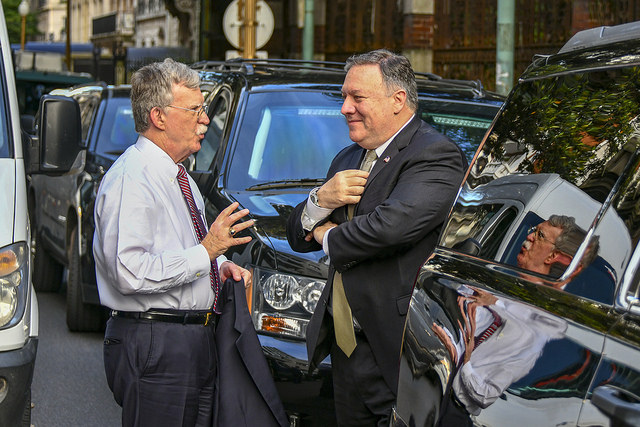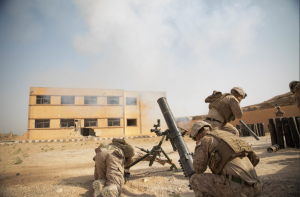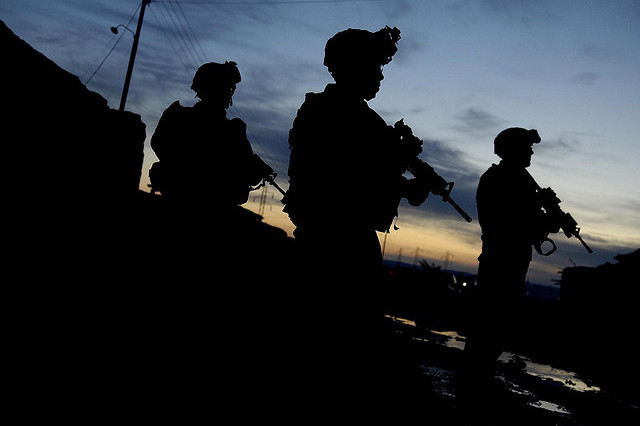by Rebecca Gordon
Events just fly by in the ever-accelerating rush of Trump Time, so it’s easy enough to miss important ones in the chaos. Paul Manafort is sentenced twice and indicted a third time! Whoosh! Gone! The Senate agrees with the House that the United States should stop supporting Saudi Arabia in Yemen (and Mitch McConnell calls this attempt to extricate the country from cooperation in further war crimes “inappropriate and counterproductive”)! Whoosh! Gone! Twelve Republican senators cross party lines to overturn Trump’s declaration of a national emergency on the U.S.-Mexico border, followed by the president’s veto! Whoosh! Gone! Delegates to the March 2019 U.N. Environment Assembly meeting agree to a non-binding but important resolution drastically reducing the production of single-use plastic. The United States delegation, however, succeeds in watering down the final language lest it “endorse the approach being taken in other countries, which is different than our own”! Once again, the rest of the world is briefly reminded of the curse of American exceptionalism and then, whoosh! Gone!
Under the circumstances, it wouldn’t be surprising if you had missed the Associated Press report about Secretary of State Mike Pompeo announcing that the United States “will revoke or deny visas to International Criminal Court personnel seeking to investigate alleged war crimes and other abuses committed by U.S. forces in Afghanistan or elsewhere.” In fact, said Pompeo, some visas may already have been denied or revoked, but he refused to “provide details as to who has been affected and who will be affected” (supposedly to protect the confidentiality of visa applicants).
National Security Advisor John Bolton had already signaled such a move last September in a speech to the Federalist Society. In what the Guardian called an “excoriating attack” on the International Criminal Court, or ICC, Bolton said, “The United States will use any means necessary to protect our citizens and those of our allies from unjust prosecution by this illegitimate court.”
By “unjust prosecution,” he clearly meant any attempt to hold Americans accountable for possible war crimes. An exception even among exceptional nations, the United States simply cannot commit such crimes. Hence, by the logic of Bolton or Pompeo, any prosecution for such a crime must, by definition, be unjust.
In calling it “this illegitimate court,” Bolton was referring to the only international venue now in existence for trying alleged war criminals whose countries cannot or will not prosecute them. By “our allies,” Bolton appeared to mean Israel, a supposition Pompeo confirmed last week when he told reporters, “These visa restrictions may also be used to deter ICC efforts to pursue allied personnel, including Israelis.”
And when it came to threats, Bolton didn’t stop there. He also suggested that the U.S. might even arrest ICC officials:
“We will ban its judges and prosecutors from entering the United States. We will sanction their funds in the U.S. financial system, and we will prosecute them in the U.S. criminal system. We will do the same for any company or state that assists an ICC investigation of Americans.”
This is a dangerous precedent indeed, as the director of the American Civil Liberty Union’s Human Rights Project, Jamil Dakwar, told Democracy Now. It’s outrageous, he pointed out, that the U.S. would prosecute “judges and the prosecutors of the ICC for doing their job and for doing the job that the United States should have done — that is, to investigate, credibly and thoroughly, war crimes and crimes against humanity that were committed in the course of the war in Afghanistan.”
What’s all this about?
The story goes back to December 2017, when Fatou Bensouda, the ICC’s chief prosecutor, announced an investigation into the possibility that U.S. military and CIA personnel had committed war crimes during America’s Afghan War or in other countries “that have a nexus to the armed conflict in Afghanistan.” These included some of the countries that hosted the CIA’s so-called black sites, where, in the earlier years of the war on terror, detainees were held incommunicado and tortured. Specifically, the ICC opened an investigation into the possible commission of “war crimes, including torture, cruel treatment, outrages upon personal dignity, rape, and other forms of sexual violence by U.S. armed forces and members of the CIA on the territories of Afghanistan, Poland, Romania, and Lithuania.”
When Bensouda made her announcement, it looked as if at least some Americans might finally be held accountable for crimes committed in the post-9/11 “war on terror” launched to avenge the criminal deaths of 3,000 souls in New York City and Washington, D.C. That never-ending war has seen the United States illegally invade and occupy Iraq; directly kill at least 210,000 civilians (not to mention actual combatants) in Iraq and Afghanistan; torture an unknown number of prisoners; and continue to detain without trial or conviction 39 men at the Guantánamo Bay prison in Cuba.
But wait. Aren’t U.S. personnel immune from ICC prosecution, because Washington never ratified the treaty that created the court?
That’s true, but the alleged crimes didn’t take place in the United States. They were committed in Afghanistan, Poland, Romania, and Lithuania, all of which have ratified the treaty. Note that Thailand, site of egregious CIA abuses, doesn’t appear on the ICC’s list, nor does Iraq (the site of the now infamous Abu Ghraib prison, among other things), presumably because neither is a signatory to the treaty.
However, before it could prosecute such crimes, the ICC would have to investigate any potential charges, interview possible witnesses, and gather the evidence necessary to prepare an indictment. That would undoubtedly require its investigators to visit the United States. This, say Bolton and Pompeo, will never be permitted.
What Is the International Criminal Court and Why Does It Matter?
The ICC’s origins go back to the Nuremberg trials at the end of World War II. In 1943, the leaders of the Allied powers — England, France, the United States, and the Soviet Union — met in Tehran, Iran. One subject on the table: how, once the war was won, the Allies would deal with Nazi war criminals. Soviet dictator Joseph Stalin is said to have proposed simply lining up and executing 50,000 Nazis. American President Franklin Delano Roosevelt reportedly tried to break the resulting tension by jokingly suggesting that 49,000 might be sufficient.
Two years later, at war’s end, confronting evidence of barbarism on a scale previously unseen in history, the war’s victors found themselves responsible for bringing accountability to the perpetrators of genocide and some modicum of justice to its victims. It was decided then to establish a tribunal, a court, where such criminals could be tried. The problem the Great Powers now faced was how to create a process that the world would consider something more than vengeance masquerading as righteousness, something more than “victors’ justice.”
The solution was to demonstrate that their prosecutions had a basis in the Geneva Conventions and other international treaties — in, that is, the already existing laws of war. In the process of designing those prosecutions, they consolidated and advanced the meaning and power of international law itself, a concept particularly needed in a postwar world of atomic weapons and a looming U.S.-Soviet conflict. Three-quarters of a century and many wars and weapon systems later, enforceable international law still remains humanity’s best hope for adjudicating past war crimes and preventing future ones — but only if great nations like the United States do not declare themselves exceptions to the rule of law.
In addition to the verdicts rendered, the Nuremberg tribunal produced other enduring results, including the 1950 Nuremberg Principles, commissioned and adopted by the new United Nations. Those principles established that actions violating international law were punishable crimes, whether they violated any specific country’s domestic laws or not. Even heads of state or other high government officials were not considered immune from prosecution for such war crimes or crimes against humanity. And no one could be exonerated for them on the sole grounds of following the orders of a superior.
In the end, however, was Nuremberg really anything more than victors’ justice? There were those who said that was all it was, invoking what was called the “tu quoque” (Latin for “you did it, too”) argument. After all, hadn’t the allies also committed war crimes? Hadn’t the British and Americans, for example, firebombed the German city of Dresden, killing 25,000 civilians in one night and destroying 75,000 homes? Indeed, it’s been argued that, because the Allies didn’t want to answer for Dresden, they excluded the earlier German air war against England from the charges brought at Nuremberg.
Nevertheless, many observers there believed that, after rendering verdicts for Nazi crimes, a more permanent tribunal would turn its attention to the crimes of the Allies. It might even, for example, have taken up the legality of the U.S. use of the world’s first atomic weapons to obliterate the Japanese cities of Hiroshima and Nagasaki. This, of course, never happened.
Nor has any court ever prosecuted those responsible for the U.S. firebombing of 67 Japanese cities. Those lesser-known attacks killed hundreds of thousands of civilians and reduced many of that country’s largely wooden urban areas to ashes. Robert McNamara, secretary of defense under Presidents John F. Kennedy and Lyndon Johnson (and an architect of American policy in Vietnam), described those attacks in Errol Morris’s brilliant documentary The Fog of War. Reflecting on his own actions in World War II when, as an Air Force captain, he served in the Office of Statistical Control (where he analyzed the efficiency of bomber aircraft), he told Morris: “What one can criticize is that the human race, prior to that time — and today! — has not really grappled with what are called the rules of war. Was there a rule that said you shouldn’t bomb, shouldn’t kill, shouldn’t burn to death a hundred thousand civilians in one night? [General Curtis LeMay, who oversaw the firebombing campaign in Japan] said if we’d lost the war, we’d all have been prosecuted as war criminals.”
What does any of this have to do with today’s International Criminal Court? The ICC is itself an outgrowth of the Nuremberg process. Even during the original Nuremberg trial, observers expected that the newly established United Nations would create a permanent war crimes court as one of its earliest actions.
In the end, it took more than half a century, but in 1998, at a United Nations General Assembly convention in Rome, 120 countries adopted the “Rome Statute,” which established the court at The Hague in the Netherlands and described its jurisdiction and rules of operation. (Among the 148 votes, there were 21 abstentions and seven “no” votes, including the United States.) The ICC officially opened in 2002, when 60 nations ratified the Rome Statute. It took up its first prosecution in 2005. Today, about 120 member states back its role on this planet.
(A side note: The ICC is often confused with the International Court of Justice, commonly called the World Court. The ICC deals with the criminal prosecution of individuals. The World Court deals with civil disputes between nations. Unlike the ICC, the United States is a member of the World Court, although its record of abiding by that court’s decisions is spotty at best.)
The United States and the ICC — a Strange Dance
Despite having participated in the work of formulating the Rome Statute, the United States never ratified it or joined the court. The first administration to deal with it would take a confusing and contradictory stance. In 1999, President Bill Clinton signed a Foreign Relations Authorization Act that included language prohibiting federal funding for the ICC and the extradition of any U.S. citizen to a country that might surrender him or her to that court for prosecution.
The following year, however, Clinton actually signed the Rome Statute, the treaty creating the ICC. In fact, the United States had been instrumental in drafting the court’s procedures, rules of evidence, and definitions of various crimes. In spite of that Foreign Relations Authorization Act, it looked as if the U.S. was on the way to future full participation in the ICC. The year 2000, however, saw the election of George W. Bush. In 2002, the Bush administration rescinded Clinton’s signature and notified the United Nations that the United States would not ratify the treaty. It was hardly a surprising move given that the Bush-Cheney administration had already begun torturing detainees in its newly born war on terror. (Torture techniques would even reportedly be demonstrated to some of those officials, including Vice President Dick Cheney and National Security Advisor Condoleeza Rice, in the White House.)
It was John Bolton, then Bush’s undersecretary of state for arms control and international security, who sent the notification letter to U.N. Secretary General Kofi Annan and personally trekked to U.N. headquarters in New York City to “unsign” the Rome Statute. That, of course, is the very John Bolton who now is Donald Trump’s national security advisor and who attacked the ICC at the Federalist Society last September. This was hardly surprising, since his record of opposing any international constraints on Washington has been long and consistent. In fact, when George W. Bush tapped him as ambassador to the United Nations in 2005, the Senate refused to confirm him. It took a recess appointment to get him the job. The Senate’s reluctance was reasonble, given Bolton’s contempt for the institution. (He’d once said that if its headquarters building “lost ten stories, it wouldn’t make a bit of difference.”)
In 2002, Bush signed the American Servicemembers Protection Act (ASPA), which, as the American Bar Association explains, contained “several provisions meant to prohibit or otherwise complicate U.S. cooperation with the ICC.” These included “restricting U.S. participation in U.N. peacekeeping operations, and prohibiting use of any appropriated funds to support or cooperate with the Court.” They also included a provision authorizing the use of military force “to liberate any American citizens held by the Court,” leading it to be dubbed by critics “the Invade The Hague Act.”
And yet even the ASPA demonstrated an American ambivalence towards the ICC. It had an amendment allowing the U.S. to cooperate with the court in order to bring “other foreign nationals accused of genocide, war crimes, or crimes against humanity” to justice. In other words, the ICC was considered good enough to try other countries’ accused war criminals, just not ours.
Under President Barack Obama, the United States began a rapprochement with the court, opening diplomatic relations and starting to attend meetings of its Assembly of States Parties as an observer, which it continues to do today. In 2011, the U.S. sent a delegation to an ICC meeting in Kampala, Uganda, where important language was adopted defining the crime of aggression.
Making an aggressive war was the first of the three categories of crimes under which Nazi leaders were charged at Nuremberg. At the time, Washington officials strongly advocated for the position that all other Nazi atrocities sprang from that initial crime. The same could well be said of the Bush-Cheney administration’s decision to invade first Afghanistan and then Iraq. Cooperation with the ICC continued under Obama, who also signed a law providing rewards of up to $5 million for the capture of individuals indicted by the court.
It should be noted that the ICC is not without its critics. African nations in particular have rightly complained that the only people who have stood trial so far are from that continent, leading some to threaten to withdraw. In 2017, Burundi did leave, but so far no other African members have followed suit. Nonetheless, the ICC remains a court of last resort when it comes to bringing war criminals to justice.
Reversing Course Under Trump
Given Trump’s “America First” rhetoric, it should hardly be surprising that the ICC is among the international organizations he and his top foreign-policy officials particularly despise. As a result, his administration has already rolled back Obama’s rapprochement and then some. In view of the president’s lack of attention to detail (not to mention his short attention span), it seems likely that John Bolton is the true architect of this latest move. It’s the State Department that grants (or doesn’t grant) visas, so Mike Pompeo made the official announcement, but this approach fits Bolton’s M.O.
The poison now seeping out of Washington continues to spread. On March 18th, Rodrigo Duterte’s Philippines became the second country to leave the ICC, where it, like the U.S., is being investigated for possible crimes — in its case, against its own people. As the Washington Post reports, the country is “under preliminary examination [by the ICC] for thousands of [domestic drug war] killings since Duterte rose to the presidency in 2016.”
In its menacing rejection of the court, the Trump administration is turning its back on the system of international law and justice the United States helped establish at Nuremberg. The rule of law must not hold only, as hotelier Leona Helmsley once said about taxes, for “the little people.” If Donald Trump had truly wanted to “make America great again,” he would have recognized that international law is not just for the little countries. The greater a world power, the more consequential is its submission to the rule of law. The attacks of John Bolton and Mike Pompeo on the ICC, however, simply represent a new spate of lawless actions from a lawless administration in an increasingly lawless era in Washington.
Reprinted, with permission, from TomDispatch.
Rebecca Gordon, a TomDispatch regular, teaches at the University of San Francisco. She is the author of American Nuremberg: The U.S. Officials Who Should Stand Trial for Post-9/11 War Crimes. (Some of the material in this piece has been adapted from that book.) Her previous books include Mainstreaming Torture: Ethical Approaches in the Post-9/11 United States and Letters from Nicaragua. Follow TomDispatch on Twitter and join us on Facebook. Check out the newest Dispatch Books, John Feffer’s new dystopian novel (the second in the Splinterlands series) Frostlands, Beverly Gologorsky’s novel Every Body Has a Story, and Tom Engelhardt’s A Nation Unmade by War, as well as Alfred McCoy’s In the Shadows of the American Century: The Rise and Decline of U.S. Global Power and John Dower’s The Violent American Century: War and Terror Since World War II. Copyright 2019 Rebecca Gordon






Excellent reportorial work by Ms. Gordon! (I think she could have included the US genocide-equivalent war crimes against North Korean humanity in 1950-53; wasn’t Lemay also the mastermind behind that?)
Ahh, the shame of being “represented” by such lowlifes. They’re ridin’ astride the world…. Sounds trite, but what is Jesus saying?